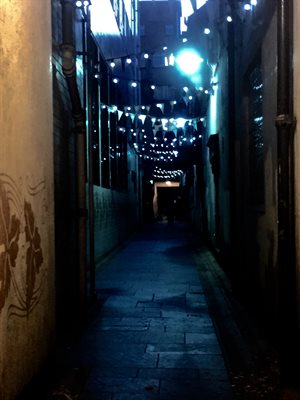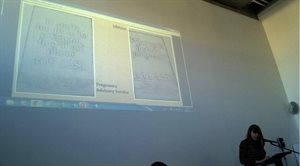Abortion and Reproductive Justice Conference: The Unfinished Revolution II (by Olivia Dee)

In June of this year I travelled to Belfast in order to present at a conference dedicated to reproductive justice and the experience of abortion for women all over the world. This was an incredible experience for me, primarily because it was the first time I had ever presented my research, and this conference was an amazing place to start. In addition, I had never travelled to Belfast before, so I was able to spend my evenings with likeminded academics from all over the globe, exploring a new city with a fascinating history.
On the first day of the conference I presented my paper, entitled Two Bodies or One? Conceptualisations of Women in English Pro-Life Discourse 1967-1992. I presented with women from America, England and Ireland, and during the session we were able to share ideas which proved invaluable for my post-graduate research. I was even given a chance to view a performance art piece directed by two artists who wanted to portray the often dangerous and stigmatic nature of abortion protest.

In the afternoon, after a series of fascinating panels, we attended a keynote address by Marlene Gerber Fried, an American activist from the Women's Global Network for Reproductive Rights. The experience of an address from such an experienced and knowledgable academic voice in the subject of reproductive justice was such a valuable addition to the conference, and to my own research.
In addition to the conference, I also used my time in Belfast to explore the networks designed to perpetuate the concept of reproductive justice by providing services for citizens who require help. I visited two clinics to understand the problems facing each, and to see how reproductive justice works in the context of society, as opposed to simply understanding the theory behind it. Finally, I attended a keynote address from Dr Sylvia Estrada-Claudio, an activist from the Philippines who provided a fascinating perspective on the concept of reproductive justice.
I left the conference with a stack of business cards, contacts and ideas about how to approach my own research. During the conference I met people from all over the world, who all focus on the same subject, but in various and distinctly different ways and with complex methods. The cards I collected each represented an academic in a vastly under researched field, but also a connection for the future who will also be expanding the field of women's history in their own chosen area. The chance to build those connections and absorb all their research was unforgettable.

Without the travel grant, I would have been unable to attend the conference. I would have not had the chance to present my research in a peer-reviewed academic setting, or had the opportunity to meet those people who have chosen a similar field of research from all over the world. I was able to do this in a city which provided opportunities for my own private research, and was at the forefront of the debate, ensuring that the research that was presented reflected a modern and critical perspective on a current issue. For the experiences and the opportunities, I cannot thank you enough.